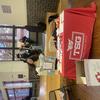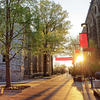Too often in conversations about student basic needs security, students’ voices are absent. When they are included, students are rarely centered as the experts and leaders they are.
We caught up with one leader in our own backyard. Halle Howard is Temple Student Government’s Director of Basic Needs. She is majoring in history and will no doubt go on to do awesome things. She already is.
As a recent Temple University alum, I know all too well about the challenges that Halle is navigating. From the woes of student workers who barely earn enough to make ends meet to the correspondingly high levels of food and housing insecurity in an increasingly expensive city (which also happens to be the "poorest big city" in America), being a student can feel daunting. There’s significant room for improvement in making more student supports available—supports that are both accessible and inclusive.
We need a robust ecosystem to dismantle student basic needs insecurity. Students like Halle are key to building an ecosystem of basic needs supports where students’ experiences are validated and where students feel empowered to not only ask for help but suggest solutions.
How did you get involved in student government?
I work as a peer advisor in the academic advising office at the College of Liberal Arts. I'm also a sports club supervisor for Campus Recreation. I feel like “student worker” was my primary identity for a long time. At Temple, as we saw with the Temple University Graduate Students Association (TUGSA) strike and now with ongoing Temple Association of University Professionals (TAUP) negotiations, there has been a disconnect between the needs of workers on campus and what the university is able to provide. Wages for student workers do not sufficiently cover the cost of living in Philadelphia.
As an undergraduate student worker myself, I helped start an organization called the Temple University Undergraduate Workers Organizing Committee.
My friends and I decided to form this organization with the goal of establishing a legal union for undergraduate workers, like TUGSA and TAUP that serve other sectors of the university workforce. Livable wages and a supportive work environment are critical in ensuring the basic needs security of student workers, graduate workers, and faculty alike. I realized my basic needs were not being addressed. There are a lot of other students on campus whose basic needs are not being met, whether that’s food and housing insecurity, or access to basic things you need to be able to thrive in an academic environment. From my work with the Undergraduate Workers Organizing Committee, getting involved with student government seemed like a good step for me to continue to advocate for students.
Can you tell me more about the Undergraduate Workers Union? You don’t often hear about undergraduate student workers having a union!
It has been in the works for a long time. We officially started it last year and spent a lot of time, care and effort internally structuring the union to ensure we recruited leaders who could answer students’ questions about how unions operate, as well as the benefits of joining one.
We aren't a current legal union yet. That's the goal and the way to do that is to file with the Pennsylvania Labor Relations Board. You can either do a wall-to-wall union consisting of all the almost 4000 student workers at Temple or it would have to be 30% of a proposed unit, which is what we’re aiming for. And that way, once we are legal, we will be able to bargain our contract.
Like I said before, working wages at Temple do not sufficiently cover the cost of living in Philadelphia. Currently, the federal minimum wage is $7.25. There are students on campus that are making $7.25 an hour and that’s not even enough to buy a meal on campus.
There are 4000 undergraduate workers, so we are absolutely an essential function of this campus, and we deserve to be compensated in a way that is commensurate with the important role we play as part of various departments. We must remember that Temple started as a night school so that people who were working during the day could still receive an education and gain the upward social mobility that college education can provide. It’s a working-class public institution and we need to get back to that legacy by making sure working-class folks here have a chance to move up.
Jobs are treated as this extra thing for some students, like petty cash but some of us really need the money to put food on the table and afford rent.
We must remember that Temple started as a night school so that people who were working during the day could still receive an education and gain the upward social mobility that college education can provide. It’s a working-class public institution and we need to get back to that legacy by making sure working-class folks here have a chance to move up.

Halle Howard
Director of Basic Needs, Temple Student Government
What does your role at Temple Student Government entail?
I'm the Director of Basic Needs so my job consists of addressing and advocating for students’ basic needs security on campus. The role was created three years ago as a response to TSG's hearing from students that they were struggling to get their basic needs met. I work with great organizations and on-campus resources like the Cherry Pantry, a free food pantry where students can swipe their student identifications cards. There is also a menstrual product vending machine at Temple’s Student Center.
In my role, one of the biggest things I've noticed is a lack of awareness about non-food-related basic needs, like personal hygiene products and cleaning supplies.
In a similar vein, I’ve been focused on expanding menstrual product access. The vending machine is only open when the Student Center and pantry are open, which isn’t all the time. I would like to expand them to make sure they're complementary so that students aren’t turned away due to cost. I’m also involved in efforts to ensure menstrual products are available in every bathroom on campus regardless of gender because we have menstruating students who are not women. We’re contacting deans of different schools at Temple to get access to spaces where we can install bins that dispense menstrual hygiene products.

Howard tabling at TSG's Nutrition Fair on November 16, 2023. TSG hosted a cleaning supplies donation drive and provided information about resources related to nutrition and basic needs.
What are some of the challenges of being in this position and how do you navigate them?
Temple is just so big with multiple schools and so many students so the size in and of itself can create institutional roadblocks. Trying to assess all the various needs of students and figuring out the right people to contact can be challenging. And sometimes, there isn’t sufficient funding or institutional interest in specific programs.
There is a need for general education around what tools students require to be supported on campus. A lot of students come to college having never done laundry before or not knowing how to cook nutritious meals for themselves. A big part of basic needs security is ensuring that students not only have the resources, but also knowledge about how to use them.
What advice do you have for students who feel hopeless seeing injustice around them and issues surrounding basic needs insecurity but don’t know how to get involved in campus related initiatives?
A lot of it comes down to learning about resources on campus and just asking. I know that can be intimidating but a lot of times just asking someone you trust for help or advice, like a professor or a club leader, is a good first step.
It’s easy to feel paralyzed about what to do. The best advice I ever got is to identify one issue you care about. For me, that has been labor rights. It is connected to my identity as a first-generation, low-income student. I decided that would be the issue that I would dedicate my time to. You have to scale it down and figure out where to go from there. You cannot do everything. But you have to start somewhere.


